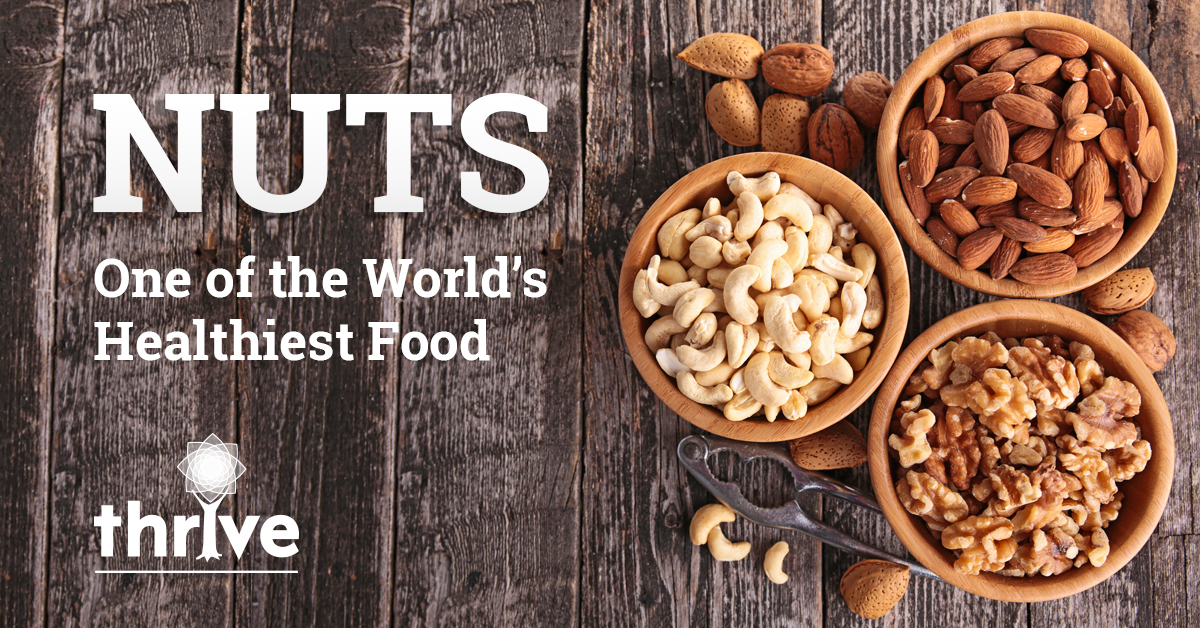What’s the healthiest food? Most people say broccoli or kale, but the real answer is nuts. Even though they’re small, they provide a concentrated dose of vitamins and nutrients that help combat a number of chronic diseases such as high blood pressure, heart disease, and even cancer. Studies have shown that people who eat nuts more than twice a week live longer, healthier lives than those who don’t, and the more you eat the longer you live. If you don’t eat nuts, you should start, and if you do eat them, you should start eating more.
Why Nuts Are So Healthy
Nuts contain high concentrations of fiber, acids, minerals, vitamins, and healthy fats (i.e. unsaturated fats) that keep your body functioning well. Some of the most important are:
- Unsaturated Fat: Unlike saturated fats, unsaturated fats lower your cholesterol, blood pressure, and triglycerides, a type of fat that hardens your arteries and increases your risk of heart disease. Unsaturated fats also lower your insulin resistance, which protects you from diabetes.
- Fiber: Everyone knows fiber regulates bowel movements, but it has health benefits beyond that. Fiber slows the rate at which your body absorbs carbohydrates, which lowers insulin sensitivity and increases the amount of time it takes for you to get hungry again, which makes it a great way to control overeating.
- Omega-3 Fatty Acid: Omga-3 fatty acids lower blood pressure, prevent irregular heartbeat (arrhythmia), reduce inflammation in your joints and lungs, and prevents plaque from building up in your blood vessels.
- Vitamin E: Vitamin E is a powerful antioxidant, which prevents cell damage. It also reduces plaque buildup in your blood vessels, balances hormone levels, protects your eyesight, and lowers your risk of dementia.
- Phytosterols: Phytosterols are molecules in plant cells similar to cholesterol. When you eat them, they prevent you from absorbing bad cholesterol in your bloodstream, lowering your risk of high blood pressure and heart disease.
- L-Arginine: L-arginine is an amino acid and the essential component of nitric oxide, a signaling molecule in your blood that relaxes blood vessels, lowers blood pressure, and helps prevent blood clots.
- Phosphorus: Phosphorus is the second most common mineral in your body. It’s important for bones, teeth, and tissue growth. You use it to store energy and it works with B vitamins to keep your kidneys, muscles, heart, and nerves functioning properly.
- Magnesium: Magnesium regulates your blood sugar and keeps your muscles and nerves operating properly. It also reduces inflammation and blood pressure.
- Manganese: Manganese is a mineral that creates strong bones, keeps your thyroid functioning properly, helps you absorb calcium, and regulates your blood sugar.
Eating nuts also raise your resting metabolism, so you burn more calories while you’re inactive – the perfect snack.
People Who Eat Nuts Live Longer
Nuts affect your health in so many different ways that it’s no surprise people who eat them live longer than people who don’t, which has been confirmed by multiple studies. The largest was published The New England Journal of Medicine in 2013. Over 118,962 people (76,464 women and 42,498 men) participated in it. Researchers sent participants questionnaires every two years asking them about their diet, including how often they ate nuts. At the end of the study in 2010, they found that nut consumption was inversely correlated with mortality. The more nuts someone ate, the less likely he or she was to develop heart disease, respiratory disease, or cancer. As a result, the nut eaters tend to live longer than non-nut eaters.
Smaller studies found the same thing. The Iowa Women’s Health Study found nut eaters live longer and suffer fewer chronic diseases than non-nut eaters. So did a 2015 Dutch study. A six-year study in California found that people who ate nuts at least four times a week suffered 51 percent fewer heart attacks than people who ate nuts less frequently. The participants were all roughly the same age and had similar diets, obesity levels, cholesterol levels, exercise habits, smoking habits, and blood pressure. The only difference was how many nuts they ate.
Nuts & Breast Cancer
For women, there’s even more good news. Eating nuts may lower your risk of breast cancer. A study published in the medical journal Gynecologic and Obstetrics Investigation found that women who ate large amounts of nuts were 2-3 times less likely to develop breast cancer than women who ate small amounts of nuts or never ate them at all.
Eating nuts at a young age helps too. A study published in Breast Cancer Research and Treatment found that women who ate nuts regularly as children were less likely to develop benign breast disease as adults. Benign breast disease causes harmless lumps to form in women’s breasts. It isn’t dangerous, but it does increase the risk of developing breast cancer later in life, especially if you have a family history of breast cancer.
Healthiest Nuts You Can Eat
If you’re thinking of adding more nuts to your diet, you should know there are a few you should concentrate on. They’re all good for you, but some are better than others.
- Walnuts: Walnuts are packed with protein, fiber, magnesium, phosphorous, vitamin C, antioxidants, and fatty acids. Four or five walnuts contains as much vitamin C as 100 oranges and an ounce of walnuts contains more omega-3 than a 4-ounce piece of salmon.
- Pistachios: Pistachios are low in calories, but high in phytosterols and potassium. They’re also a great source of copper, manganese, and B6. Eating unshelled pistachios also helps you lose weight. A study conducted by the Eastern Illinois University found that people who ate pistachios still in their shells only ate 125 calories worth of nuts, while people who ate pistachios without their shells ate 211 calories worth.
- Almonds: Almonds contain loads of protein, fiber, copper, and magnesium. One ounce provides eight percent of your daily calcium and half of your daily vitamin E. Almonds lower cholesterol, reduce cancer risk, and increase insulin sensitivity in people with prediabetes.
- Pecans: Pecans contain over 19 vitamins, minerals and other nutrients, including vitamin A, vitamin E, vitamin B, calcium, folic acid, magnesium, copper, phosphorus, potassium, manganese, and zinc. They’re also extremely rich in antioxidants.
- Peanuts: Peanuts aren’t actually nuts, they’re legumes, but they’re just as effective as tree nuts in reducing morbidity and mortality. They’re rich in protein, vitamin B, magnesium, and phytosterols. They were the primary nut eaten by the girls in the Breast Cancer Research and Treatment study and they help reduce your risk of developing cancer.
- Brazil Nuts: Brazil nuts are a great source of copper, phosphorus, protein, niacin, fiber, vitamin E, and manganese. One or two also contains enough selenium for an entire day. Selenium is an antioxidant that fights breast cancer.
The best way to stay healthy is to eat as many different kind of nuts as possible. If you don’t like eating them on their own, be creative. Throw some on a salad or cook them up in your soup. Crush them and mix them into a smoothie. Stir them into your oatmeal or your yogurt. Sprinkle a few on your ice cream. They’re extremely versatile and even a small amount can make a big difference.




Add new comment